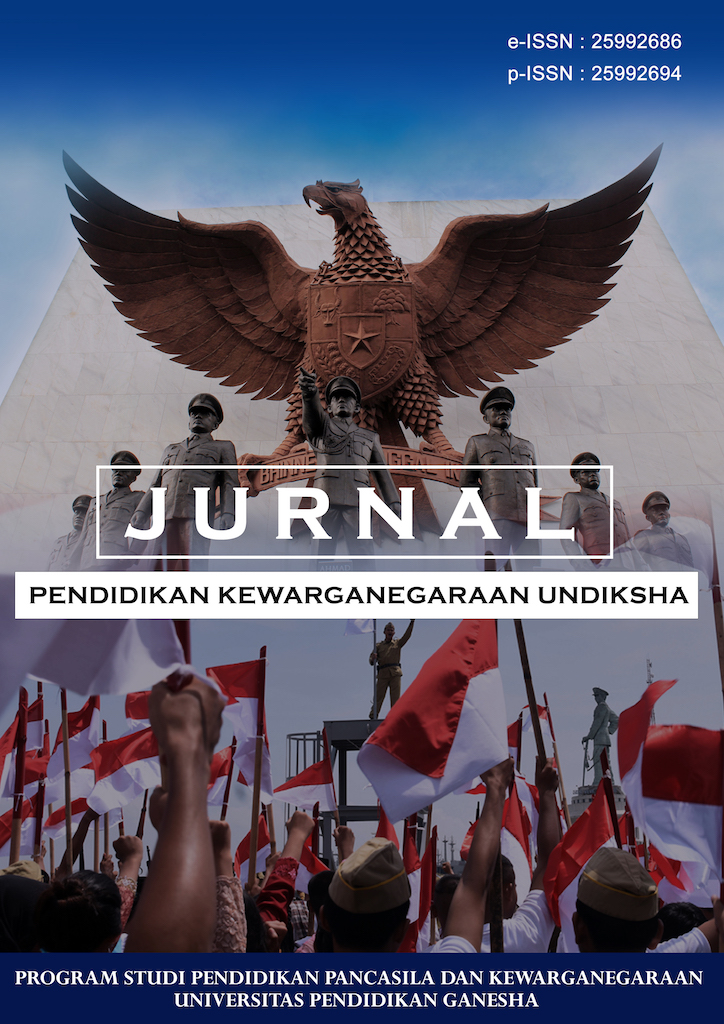MENGELOLA E-LEARNING MELALUI PEMBELAJARAN KOLABORATIF DI DALAM KELAS YANG MULTIKULTURAL
DOI:
https://doi.org/10.23887/jpku.v9i2.34135Abstract
Sikap individualis merupakan salah satu permasalahan dalam implementasi e-learning. Untuk itu, artikel ini bertujuan untuk menjelaskan pengelolaan e-learning melalui pembelajaran kolaboratif utamanya dalam kelas yang multikultural. Dengan pembelajaran kolaboratif, diharapkan dapat meminimalisir sikap individualisme siswa. Artikel ini ditulis dengan mengikuti metode studi pustaka dengan pendekatan integrative review. Terdapat empat langkah yang dilakukan dalam penulisan artikel ini, yakni: mendesain review, melaksanakan review, menganalisis, dan menulis laporan. Berdasarkan kajian yang telah dilakukan, terdapat tiga poin penting yang dibahas dalam artikel ini. Pertama, artikel ini membahas mengenai hubungan antara teknologi dan e-learning. Kedua, dilanjutkan dengan penjelasan mengenai pembelajaran kolaboratif. Ketiga, atau bagian terakhir, dijelasakan keragaman/multikulturalisme di dalam kelas online. Masing-masing poin tersebut memberikan gambaran mengenai hal-hal yang penting untuk diperhatikan dalam pelaksanaan e-learning, utamanya dalam mewujudkan pembelajaran kolaboratif yang mampu memupuk rasa kebersamaan siswa. Diharapkan, melalui penerapan pembelajaran kolaboratif, efek individualis dari penerapan e-learning dapat ditangkal.
References
Adimora, D. E., Nwokenna, E. N., Omeje, J. C., & Eze, U. N. (2015). Influence of Socio-Economic Status and Classroom Climate on Mathematics Anxiety of Primary School Pupils. Procedia - Social and Behavioral Sciences, 205, 693–701. https://doi.org/https://doi.org/10.1016/j.sbspro.2015.09.109
Akiba, M., Murata, A., Howard, C. C., & Wilkinson, B. (2019). Lesson study design features for supporting collaborative teacher learning. Teaching and Teacher Education, 77, 352–365. https://doi.org/https://doi.org/10.1016/j.tate.2018.10.012
Almerich, G., Orellana, N., Suárez-Rodríguez, J., & Díaz-García, I. (2016). Teachers’ information and communication technology competences: A structural approach. Computers & Education, 100, 110–125. https://doi.org/https://doi.org/10.1016/j.compedu.2016.05.002
Altugan, A. S. (2015). The Relationship Between Cultural Identity and Learning. Procedia - Social and Behavioral Sciences, 186, 1159–1162. https://doi.org/https://doi.org/10.1016/j.sbspro.2015.04.161
Amandu, G. M., Muliira, J. K., & Fronda, D. C. (2013). Using Moodle E-learning Platform to Foster Student Self-directed Learning: Experiences with Utilization of the Software in Undergraduate Nursing Courses in a Middle Eastern University. Procedia - Social and Behavioral Sciences, 93, 677–683. https://doi.org/https://doi.org/10.1016/j.sbspro.2013.09.260
Amarulloh, A., Surahman, E., & Meylani, V. (2019). Refleksi Peserta Didik Terhadap Pembelajaran Berbasis Digital. Metaedukasi, 1(1), 13–23.
Arvaja, M., & Häkkinen, P. (2010). Social Aspects of Collaborative Learning (P. Peterson, E. Baker, & B. B. T.-I. E. of E. (Third E. McGaw (eds.); pp. 685–690). Elsevier. https://doi.org/https://doi.org/10.1016/B978-0-08-044894-7.00624-2
Baharin, A. T., Lateh, H., Nawawi, H. mohd, & Nathan, S. S. (2015). Evaluation of Satisfaction Using Online Learning with Interactivity. Procedia - Social and Behavioral Sciences, 171, 905–911. https://doi.org/https://doi.org/10.1016/j.sbspro.2015.01.208
Bhat, S., Bhat, S., Raju, R., D’Souza, R., & K.G., B. (2020). Collaborative Learning for Outcome Based Engineering Education: A Lean Thinking Approach. Procedia Computer Science, 172, 927–936. https://doi.org/https://doi.org/10.1016/j.procs.2020.05.134
Coopasami, M., Knight, S., & Pete, M. (2017). e-Learning readiness amongst nursing students at the Durban University of Technology. Health SA Gesondheid, 22, 300–306. https://doi.org/https://doi.org/10.1016/j.hsag.2017.04.003
Dağ, F., & Geçer, A. (2009). Relations between online learning and learning styles. Procedia - Social and Behavioral Sciences, 1(1), 862–871. https://doi.org/https://doi.org/10.1016/j.sbspro.2009.01.155
Damary, R., Markova, T., & Pryadilina, N. (2017). Key Challenges of On-line Education in Multi- cultural Context. Procedia - Social and Behavioral Sciences, 237, 83–89. https://doi.org/https://doi.org/10.1016/j.sbspro.2017.02.034
de Jong, L., Meirink, J., & Admiraal, W. (2019). School-based teacher collaboration: Different learning opportunities across various contexts. Teaching and Teacher Education, 86, 102925. https://doi.org/https://doi.org/10.1016/j.tate.2019.102925
Dishon, D., & O’Leary, P. W. (1984). A Guidebook for Co-operative Learning: A Technique for Creating More Effective Schools. Learning Publications.
Downloads
Published
Issue
Section
License
Authors who publish with the Jurnal Pendidikan Kewarganegaraan Undiksha agree to the following terms:
- Authors retain copyright and grant the journal the right of first publication with the work simultaneously licensed under a Creative Commons Attribution License (CC BY-SA 4.0) that allows others to share the work with an acknowledgment of the work's authorship and initial publication in this journal.
- Authors are able to enter into separate, additional contractual arrangements for the non-exclusive distribution of the journal's published version of the work (e.g., post it to an institutional repository or publish it in a book), with an acknowledgment of its initial publication in this journal.
- Authors are permitted and encouraged to post their work online (e.g., in institutional repositories or on their website) prior to and during the submission process, as it can lead to productive exchanges, as well as earlier and greater citation of published work. (See The Effect of Open Access)










